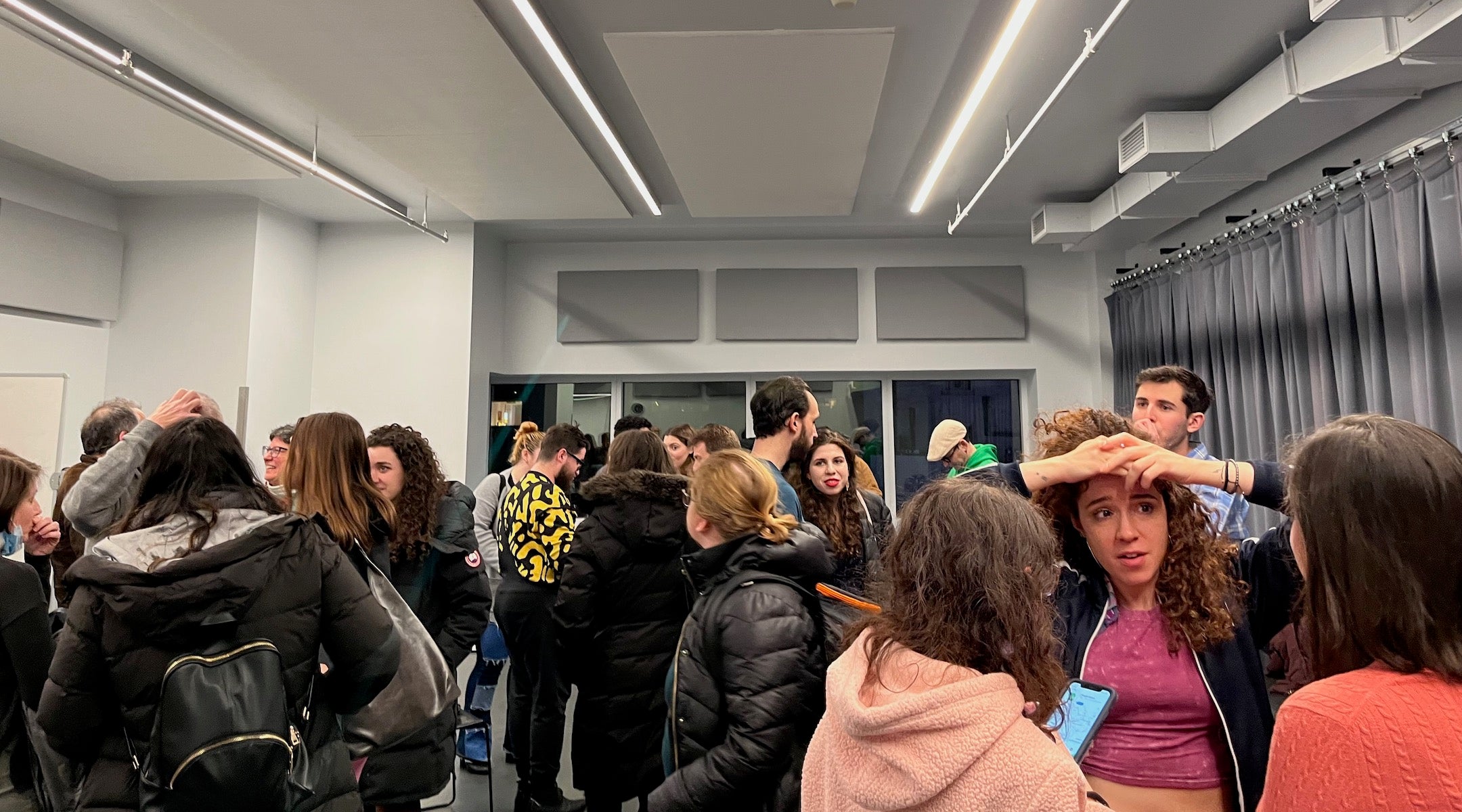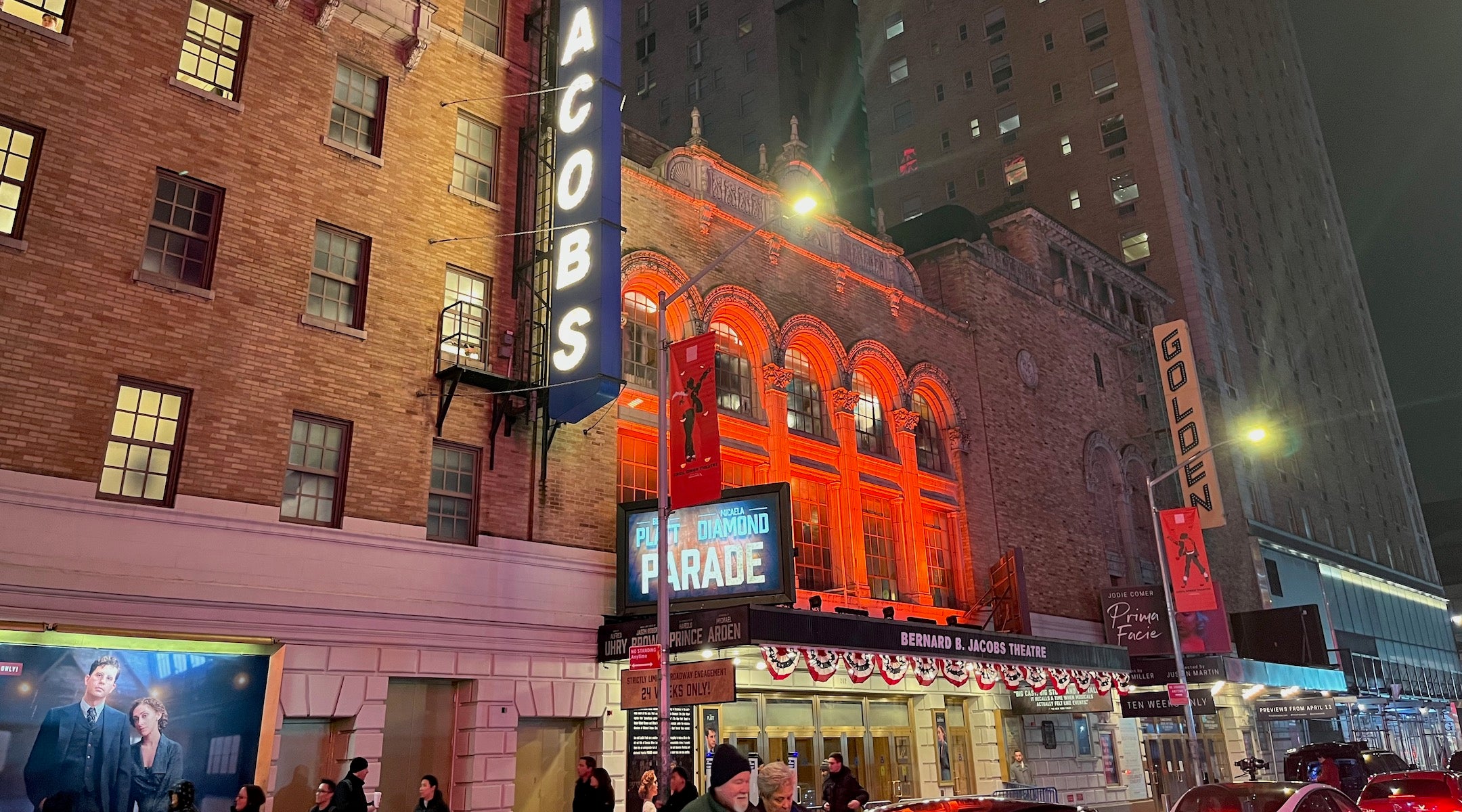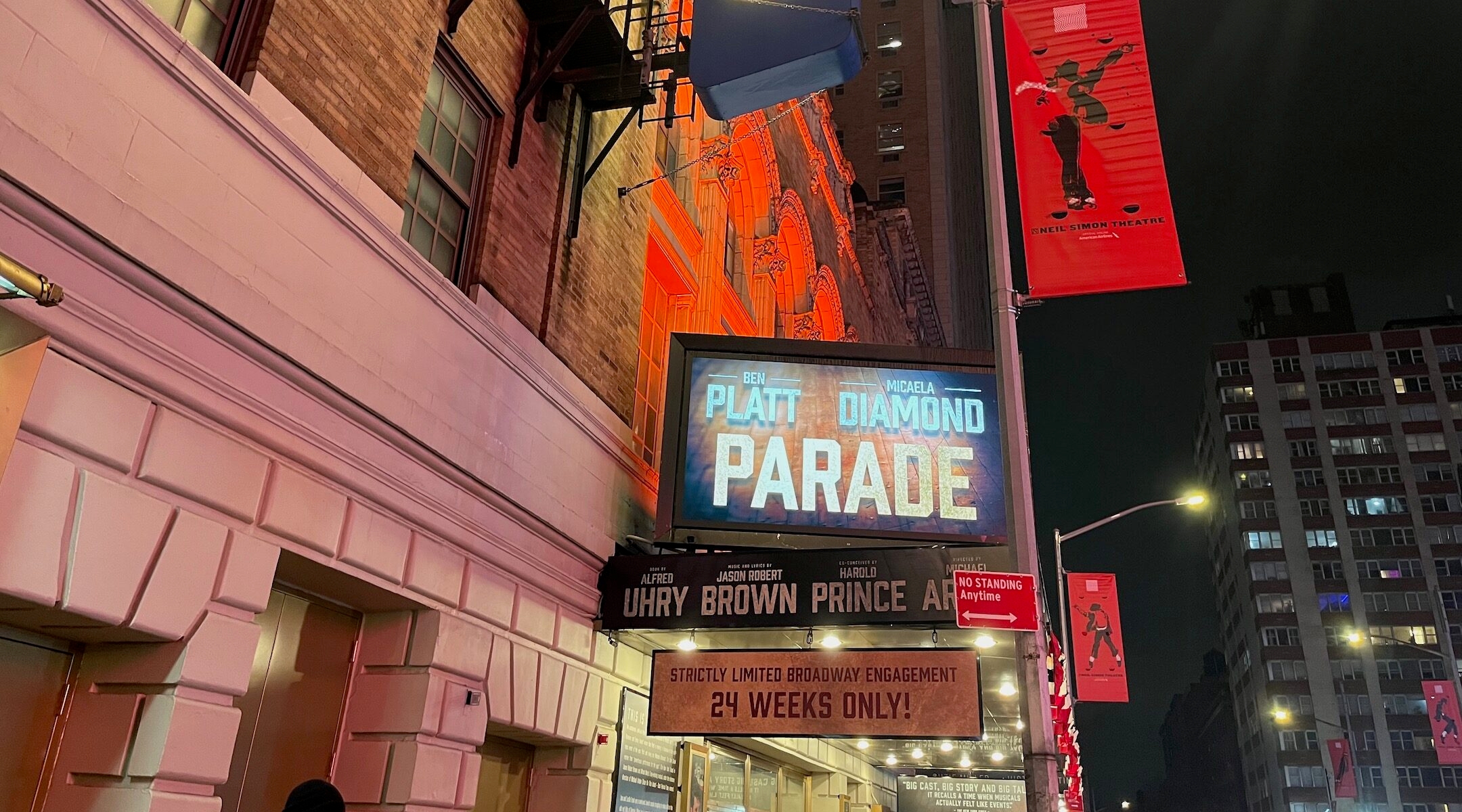(New York Jewish Week) – Twenty-four hours after neo-Nazi agitators heckled ticket-holders outside the first preview of “Parade,” a musical about a notorious antisemitic incident, Jewish members of New York’s theater community came together to share their emotions and reactions and look to the future.
The gathering, organized by producer and actor Ari Axelrod, was held on a rainy Wednesday afternoon in a rehearsal space at Open Jar Studios in Times Square. It was just three blocks north of the Bernard B. Jacobs Theatre, where “Parade” is currently in previews. About 50 people from all ranks of the theater industry — from Broadway producers and marquee stars to undergraduate students in college shows — joined the conversation.
Starring Jewish actor Ben Platt, “Parade” tells the story of Leo Frank, a Jewish factory manager accused and found guilty of murdering a girl who worked for him, despite little evidence. In 1915, Frank was kidnapped from jail and lynched by a mob, and the case led to the creation of the Anti-Defamation League and a resurgence of interest in the Ku Klux Klan.
At the show’s first preview on Feb. 21, protestors who identified with the National Socialist Movement, a neo-Nazi group headquartered in Florida, accused Frank of being a pedophile and condemned audience members for paying to support pedophiles and Jews.
“The story about Leo Frank is not a new one. They could be protesting anywhere. But there is a reason they knew that that play was happening and where it was happening,” said Axelrod, who told the New York Jewish Week that he has been thinking about holding a gathering in response to antisemitism for nearly two years. “It feels like they came into our home, not just our home as Jews, but our home as theater artists.”
Axelrod, 28, opened by leading the Shehechiyanu, a prayer of gratitude, and a round of deep breaths.
“The intention for today is not to find a solution to the rise in antisemitism or even the solution to what happened yesterday,” Axelrod told the crowd. “The intention is to be in a space and find community and gather as Jews, which is what we’ve been doing for thousands of years. To commiserate and talk and bear witness to how we’re feeling and how other people are feeling, to be seen and heard and held and valued and validated as an individual and as a member of a community.”

The room was full of Jewish and some non-Jewish people in the theater industry of all ages who wanted to express their thoughts and ideas about the protests. (Julia Gergely)
Many in the room felt fear, sadness, frustration and anger at the events. For an assistant on the production team of “Parade” — who asked to remain anonymous because he came to process his own feelings and not as a representative of the show — “it was emotional, especially because not everyone on the team is Jewish. So just being there as a Jewish person, hearing them say that to people going into the show was hard.”
However, he noted the importance of committing to see and work on the show. “Just being at the show last night was its own protest to what they were saying,” he said, adding that the team behind “Parade” is committed to ensuring a safe environment for everyone involved and that they don’t want to let the protests deter people from seeing the show, which is scheduled to run through Aug. 6.
Elliott Masie, a Broadway producer who was on the line with his wife when the threats and jeers began, said his initial reaction was surprise. “I couldn’t discern what they were about at first. They tried to pretend that they were against pedophiles, but then their rhetoric escalated and they started to go up to people in the line and say ‘You paid so much for this, to advocate for a Jew.’ The moment I heard them say the word ‘Jew,’ I realized what they were,” he told the New York Jewish Week.
“The hardest part was that it seemed like most people coming into the theater didn’t understand who they were,” Masie, 72, added.
Still, he said, the show was wonderful. “I’ve never been at a first preview that had as prolonged an ovation. In some ways, they stole the moment. We have to give the moment back and give the moment to all of us. The ultimate love and support we need to do is show the cast and the company that we’re here,” he said.
Over the last year, Jewish stories have been having a moment on Broadway and off, with “Funny Girl,” “Leopoldstadt” and “Fiddler on the Roof in Yiddish” all coming to the stage in 2022. Surrounding each show has been discussions of their relevance at time when watchdog groups have been reporting a rise in antisemitic incidents.
“The entire cast of our show and company was scared last night that we were going to walk out to something similar,” said David Krumhotlz, who is in the final weeks of his role as patriarch Hermann Merz in “Leopoldstadt,” Tom Stoppard’s play about the Holocaust. “Thank God it didn’t. We stand in solidarity not only with ‘Parade,’ but with the entire Jewish Broadway community.”
Yael Chanukov, a cast member of “Fiddler on the Roof in Yiddish,” spoke about the safety and security discussions the cast and crew had during the show’s run and the fear and anxiety she felt at times doing such a proudly Jewish show that otherwise was one of the most fulfilling experiences of her life.

The Bernard B. Jacobs Theatre, where “Parade” is in previews, Feb. 22, 2023. (Julia Gergely)
For many, it was an exhalation of years of frustration and confusion over minor and major antisemitism they said they experienced in the theater industry and beyond.
While Axelrod said the goal of Wednesday’s gathering wasn’t to find solutions, by the end of the evening, he had cemented an idea for a Jewish advocacy coalition within the theater industry. He said it might offer resources and tools for how to speak up and show up to support the Jewish theater community.
Representatives from the Anti-Defamation League and Jews for Racial & Economic Justice who were at the meeting offered to help get contacts and funding if the idea were to get off the ground.
“The general tenor that I’m getting is that no one is asking the theater community to make the fight against antisemitism the top priority. Just make it a priority,” Axelrod said.
Actor and writer Mike Haber, 31, had tickets for Wednesday night’s performance of “Parade.”
“Last night, I literally couldn’t even sleep because of what happened,” he said. “This is so beautiful to see so many theater people and we’re all coping with the same emotions and feelings.”
Ninety minutes before the Wednesday evening performance began, the rain had stopped and all was calm in front of the theater. Haber took pictures and burst out singing the show’s tunes. “I love this,” he said. “I can’t wait to see it.”
The New York Jewish Week brings you the stories behind the headlines, keeping you connected to Jewish life in New York. Help sustain the reporting you trust by donating today.





